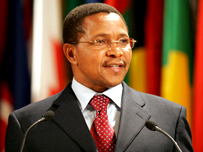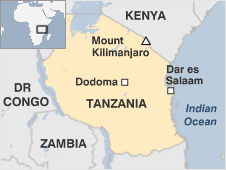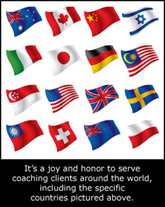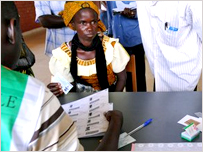
Country profile: Tanzania

The Tanzanian drug policy specifically highlights the government’s intention to ensure that
quality, effective essential medicines reach all Tanzanians at an affordable price. Using case
study examples, this study explored the concept of access to essential medicines in four
dimensions: physical availability, affordability, geographic accessibility, and acceptability (or
satisfaction) defined as the fit between users’ and providers’ attitudes and expectations about
products and services and the actual characteristics of these products and services (MSH,
2001). Three pharmaceutical companies involved in Public-Private Partnerships (PPPs) were
studied — two in Dar es Salaam city (Shelys and Keko) and one in Arusha town (Tanzanian
Pharmaceutical Industry (TPI)). Data was also collected from the relevant government ministries,
departments, and agencies; and development partners
Tanzania has been spared the internal strife that has blighted many African states.
Though it remains one of the poorest countries in the world, with many of its people living below the World Bank poverty line, it has had some success in wooing donors and investors.
Tanzania assumed its present form in 1964 after a merger between the mainland Tanganyika and the island of Zanzibar, which had become independent the previous year.
Overview
Unlike many African countries, whose potential wealth contrasted with their actual poverty, Tanzania had few exportable minerals and a primitive agricultural system.
 |
AT-A-GLANCE
 Politics:
Politics: President Jakaya Kikwete won elections in 2005 Economy: Annual growth rate between 2000 and 2006 averaged 5.8 per cent, one of best performers in sub-Sahara Africa. Power supplies are erratic and fall short of demand.
International: Tanzania hosts thousands of refugees from conflict in the neighbouring Great Lakes region
|
To remedy this, its first president, Julius Nyerere, issued the 1967 Arusha Declaration, which called for self-reliance through the creation of cooperative farm villages and the nationalisation of factories, plantations, banks and private companies.
But a decade later, despite financial and technical aid from the World Bank and sympathetic countries, this programme had completely failed due to inefficiency, corruption, resistance from peasants and the rise in the price of imported petroleum.
Tanzania's economic woes were compounded in 1979 and 1981 by a costly military intervention to overthrow President Idi Amin of Uganda.
After Mr Nyerere's resignation in 1985, his successor, Ali Hassan Mwinyi, attempted to raise productivity and attract foreign investment and loans by dismantling government control of the economy.
This policy continued under Benjamin Mkapa, who was elected president in 1995. The economy grew, though at the price of painful fiscal reforms. Tourism is an important revenue earner; Tanzania's attractions include Africa's highest mountain, Kilimanjaro, and wildlife-rich national parks such as the Serengeti.
The political union between Zanzibar and mainland Tanzania has weathered more than four decades of change. Zanzibar has its own parliament and president.
Facts
- Full name: United Republic of Tanzania
- Population: 43.7 million (UN, 2009)
- Capital: Dodoma (official), Dar es Salaam (commercial)
- Largest city: Dar es Salaam
- Area: 945,087 sq km (364,900 sq miles)
- Major languages: English, Swahili
- Major religions: Christianity, Islam
- Life expectancy: 55 years (men), 56 years (women) (UN)
- Monetary unit: 1 Tanzanian shilling = 100 cents
- Main exports: Sisal, cloves, coffee, cotton, cashew nuts, minerals, tobacco
- GNI per capita: US $440 (World Bank, 2008)
- Internet domain: .tz
- International dialling code: +255
Leaders
President: Jakaya Kikwete
Ruling party candidate Jakaya Kikwete, Tanzania's long-serving foreign minister, won presidential elections in December 2005.
He vowed to continue the economic reforms set in motion by the outgoing president, Benjamin Mkapa, and to create jobs and tackle poverty.
A veteran of the ruling Chama Cha Mapinduzi (CCM), which has controlled Tanzania since the country's inception and also governs in semi-autonomous Zanzibar, his presidential aspirations were thwarted in 1995 when he made an unsuccessful bid to represent the party in polls.
The former military officer was an unswerving supporter of Tanzania's founding president, Julius Nyerere.
Mr Kikwete, who was born in October 1950, is married and has eight children.
His predecessor Benjamin Mkapa retired after 10 years in power. He was credited with being the driving force behind Tanzania's extensive economic liberalisation, which was well received by the IMF and World Bank.
Under his presidency inflation dropped, the economy grew and Tanzania's foreign debt was wiped. But Mr Mkapa's critics said that, behind the statistics, most Tanzanians remained impoverished.
Media
Tanzania's media scene, once small and largely state-controlled, developed rapidly following the advent of the multi-party era in the mid 1990s.
Television was a latecomer: President Nyerere opposed it as a luxury which would widen the gap between rich and poor. State-run TV launched in 2001, several years after the first private station went on the air in 1994. TV viewing is eroding radio's traditional dominance.
Although the growth of the broadcast media has been hindered by a lack of capital investment, dozens of private FM radio stations are on the air, most of them in urban areas.
News bulletins from international radio stations - including the BBC, Voice of America and Germany's Deutsche Welle - are carried by many stations.
The mainland and Zanzibar have separate media policies. Liberalisation measures enshrined in a 2001 media bill did not apply to the islands. There are no private broadcasters or newspapers in Zanzibar, though many locals can receive mainland broadcasters and read the mainland press.
The press
Television
- Tanzania Broadcasting Corporation (TBC) - state-run
- Independent Television (ITV) - widely-watched private network, owned by IPP Media
- Dar es Salaam Television (DTV) - private network operated by Africa Media Group
- Coastal Television Network (CTN) - private, Dar es Salaam
- Star TV - private
- TV Zanzibar - state-run
Radio
- Tanzania Broadcasting Corporation (TBC) - state-run
- Parapanda Radio Tanzania (PRT) - state-run FM station set up to counter competition for younger listeners from private stations
- Radio Free Africa - private FM network
- Radio One - private, owned by IPP Media
- Radio Uhuru - private, in Dar es Salaam and other cities
- Kiss FM - private, in Dar es Salaam and other cities
- Clouds FM - private, in Dar es Salaam and other cities
- Orkonerei Radio Service (ORS) - community, operated by non-governmental agency
- Voice of Tanzania-Zanzibar - state-run radio on Zanzibar
News agency

AFRICA | ASIA-PACIFIC | AMERICAS | EUROPE | MIDDLEEAST | SOUTHASIA



Mauritania Mauritius Morocco Mozambique Namibia Niger Nigeria Republic-of-congo Rwanda Sao-tome-and-principe Senegal Seychelles Sierra-leone Somalia South-africa Sudan Swaziland Tanzania The-gambia Togo Tunisia Uganda Australia Brunei Burma Cambodia China East-timor Fiji Indonesia Japan Kazakhstan Kiribati Kyrgyzstan Laos Malaysia Marshall-islands Micronesia Mongolia Nauru New-zealand North-korea Palau Papua-new-guinea Samoa Singapore Solomon-islands South-korea Taiwan Tajikistan Thailand The-philippines Tonga Turkmenistan Tuvalu Uzbekistan Vanuatu Vietnam Antigua-and-barbuda Belize Bolivia Brazil Canada Chile Colombia Costa-rica Cuba Dominica Dominican-republic Ecuador El-salvador Grenada Guatemala Guyana Haiti Honduras Jamaica Mexico Nicaragua St-kitts-and-nevis St-lucia Suriname Trinidad-and-tobago Uruguay Venezuela Albania Andorra Armenia Austria Azerbaijan Belarus Belgium Bosnia-hercegovina Bulgaria Croatia Cyprus Czech-republic Denmark Estonia Finland France Georgia Germany Greece Hungary Iceland Ireland Italy Latvia Liechtenstein Lithuania Luxembourg Macedonia Malta Moldova Monaco Montenegro Norway Poland Portugal Russia San-marino Serbia Slovakia Slovenia Spain Sweden Algeria Egypt Iran Iraq Israel-and-palestinian-territories Jordan Kuwait Lebanon Libya Mauritania Oman Saudi-arabia Sudan Syria Tunisia United-arab-emirates Yemen Afghanistan Bangladesh Bhutan India Nepal Pakistan Sri-Lanka The-Maldive






